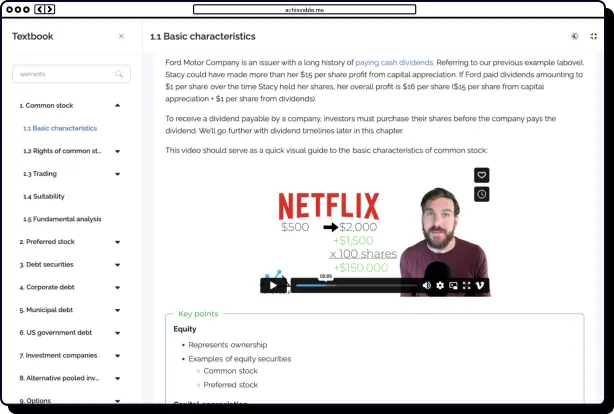
Series 63 vs 66: Key differences




Table of contents
The Series 63 and Series 66 licenses are important qualifications issued by FINRA (the Financial Industry Regulatory Authority) for professionals aiming to advance their careers in the securities and financial services industries. The Series 63 license enables individuals to act as securities agents in their respective states, while the Series 66 license combines specific aspects of both the Series 63 exam and the Series 65 exam, offering broader capabilities for financial professionals.
In this article, we’ll briefly compare the Series 66 vs. Series 63 licenses, examining the requirements, benefits, and limitations of each to help you determine which path aligns best with your professional goals.

Series 63
The Series 63 license is a crucial state-level qualification for individuals aiming to register as securities agents and conduct securities business within a specific state. Designed to ensure compliance with state-level securities regulations, the Series 63 focuses on laws related to the sale and solicitation of securities. With the Series 63 license, professionals are authorized to solicit orders for various securities, including stocks, bonds, and other assets, within the state where they are registered.
To officially register as a securities agent, candidates must first complete their Securities Industry Essentials (SIE) exam and the Series 7 exam, which requires firm sponsorship. While these licenses are not required to sit for the Series 63 test, they must be taken to enjoy the full benefits of licensure.
The Series 63 exam is completely multiple-choice, featuring 60 questions that must be answered within a 75-minute period. Achieving a minimum score of 72%, which is equal to 43 correct responses, is necessary to pass the Series 63 exam. Passing the exam alone, however, does not automatically grant you the Series 63 license. Additional requirements, including a background check and an application through a FINRA-member firm, must also be submitted in order to become fully licensed with the Series 63.
Series 66
The Series 66 license, like the Series 63 license, is a state-level credential governed by state securities regulators. While the Series 63 license authorizes individuals to solicit securities transactions within a specific state, the Series 66 license takes it a step further by also qualifying holders as investment adviser representatives. Essentially, the Series 66 combines the scope of both the Series 63 and Series 65 licenses into a single comprehensive license. By earning a Series 66 license, candidates gain all the privileges of both the Series 63 and Series 65 licenses, eliminating the need to take both exams separately.
The requirements for obtaining a Series 66 license are completing the Securities Industry Essentials (SIE) exam and having an active Series 7 license. The Series 66 exam consists of 100 questions with a 150-minute time limit, making it twice as lengthy as the Series 63 exam. To pass the Series 66 exam, you must correctly answer at least 73 out of 100 questions, or achieve a score of 73%. Remember, passing either the Series 63 exam or Series 66 exam does not immediately grant a license: they are necessary steps toward registration in your chosen state.
Which one should I hold?
The table below allows you to easily compare key distinctions between the two licenses and corresponding exams. The Series 66 is a longer, more comprehensive test, but passing it grants license holders a wider range of allowed activities:
License | Series 63 | Series 66 |
|---|---|---|
Official title | Securities Agent State Law Exam | Combined State Law Exam |
Purpose | Enables registered securities agents to sell securities in a chosen state | Enables registered securities agents and financial advisors to sell securities and provide investment advice in a chosen state |
Prerequisite | None | Series 7 (co-requisite) |
Time limit | 75 minutes | 150 minutes |
Questions | 60 | 100 |
Passing score | 43/60 (72%) | 73/100 (73%) |
Cost | $147 | $177 |
In general, the type of license you need depends on your professional goals and responsibilities. If your primary focus is acting as a securities representative, obtaining the Series 63 license will typically be sufficient. However, if you plan to expand your role to include providing investment advice in addition to transacting securities, pursuing the Series 66 license might be a better option. The Series 66 not only covers the functions of a securities representative but also qualifies you to offer investment advisory services.
It’s important to consider how your career may evolve. If you are just starting out in finance and are aiming to provide both transactional and advisory services, then earning the Series 66 license early can streamline the process. If you are currently working solely in securities but anticipate moving into investment advising, consider taking the shorter Series 65 licensing exam for financial advisors. Taking the Series 66 exam at the start of your career as opposed to the Series 63 or 65 ensures you are prepared for future opportunities in securities sales and investment advisory roles.

Conclusion
Hopefully, this article has provided guidance on whether the Series 63 or Series 66 is right for you. Both FINRA licenses are useful for a career in the finance and securities industry, but they serve different needs. As such, it’s important to choose the license you need carefully based on your desired career path.

